

Meaning of life. Questions Questions about the meaning of life have been expressed in a broad variety of ways, including the following: What is the meaning of life?
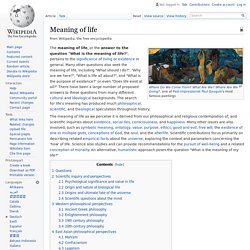
What's it all about? Who are we? [1][2][3] Philosopher in Meditation (detail) by RembrandtWhy are we here? These questions have resulted in a wide range of competing answers and arguments, from scientific theories, to philosophical, theological, and spiritual explanations. Scientific inquiry and perspectives. Tiresias. Balanced. Balanced and Restorative Justice Philosophy The foundation of restorative juvenile justice practice is a coherent set of values and principles, a guiding vision, and an action-oriented mission.
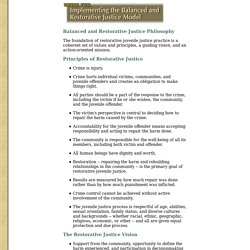
Principles of Restorative Justice Crime is injury. Crime hurts individual victims, communities, and juvenile offenders and creates an obligation to make things right. 59 Uriel Ralph Waldo Emerson Ralph Waldo Emerson Selected Poetry and Prose [POEM] 59 Uriel Ralph Waldo Emerson Ralph Waldo Emerson Selected Poetry and Prose [POEM] M.youtube. Www.britannica. Uriel, in the Jewish and Christian Apocrypha and Pseudepigrapha, a leading angel, sometimes ranked as an archangel with Michael, Gabriel, and Raphael.
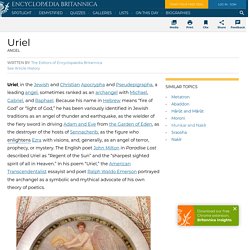
Because his name in Hebrew means “fire of God” or “light of God,” he has been variously identified in Jewish traditions as an angel of thunder and earthquake, as the wielder of the fiery sword in driving Adam and Eve from the Garden of Eden, as the destroyer of the hosts of Sennacherib, as the figure who enlightens Ezra with visions, and, generally, as an angel of terror, prophecy, or mystery. Www.jstor. Www.revolvy. The first page of "Uriel" as it appears in Poems (1847) "Uriel" is a poem by American writer Ralph Waldo Emerson.

Overview. 6. Aviso de redireccionamiento. Petrone T. Janus. 9780190215330.001. Www.iep.utm. Montaigne. Miguel de Montaigne Arrogance: the human condition Que sais-je?

(What do I know?) That is the question that has driven philosophers for millennia. For many people the idea of questioning one's own knowledge seems silly. One quality that philosophers typically share is the urge to question deeply. Perhaps it was Montaigne's experience as a magistrate (judge) that led him to his view that few cases of dispute are ever cut and dry.
Notion of ambiguity to philosophical, scientific, and religious theories. Philojain. Jainism emphatically asserts that every soul is capable of attaining perfection if it willfully exerts in that direction.
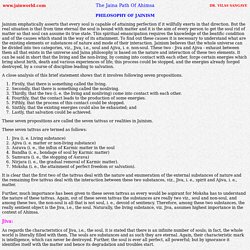
But the real situation is that from time eternal the soul is bound with matter and it is the aim of every person to get the soul rid of matter so that soul can assume its true state. This spiritual emancipation requires the knowledge of the beatific condition and of the causes which stand in the way of its attainment.
To find out these causes it is necessary to understand what are the existing elements or substances of nature and mode of their interaction. Jainism believes that the whole universe can be divided into two categories, viz., Jiva, i.e., soul and Ajiva, i. e. non-soul. Www.iep.utm. En.m.wikipedia. Ancient Indian religion originating in the Indian subcontinent Jainism (), traditionally known as Jain Dharma, is an ancient Indian religion.
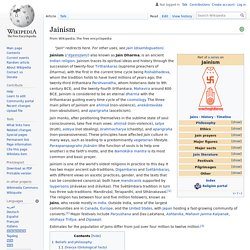
The three main pillars of Jainism are ahiṃsā (non-violence), anekāntavāda (non-absolutism), and aparigraha (non-attachment). Jains take five main vows: ahiṃsā (non-violence), satya (truth), asteya (not stealing), brahmacharya (sexual continence), and aparigraha (non-possessiveness). These principles have affected Jain culture in many ways, such as leading to a predominantly vegetarian lifestyle. En.m.wikipedia. Jain philosophy is the oldest Indian philosophy that separates body (matter) from the soul (consciousness) completely.[1] Jain philosophy deals with reality, cosmology, epistemology (study of knowledge) and Vitalism.
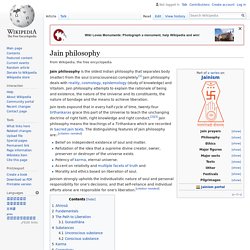
Jain philosophy attempts to explain the rationale of being and existence, the nature of the Universe and its constituents, the nature of bondage and the means to achieve liberation. Jain texts expound that in every half-cycle of time, twenty-four tirthankaras grace this part of the Universe to teach the unchanging doctrine of right faith, right knowledge and right conduct. Jain philosophy means the teachings of a Tirthankara which are recorded in Sacred Jain texts. The distinguishing features of Jain philosophy are:-[citation needed] Jainism strongly upholds the individualistic nature of soul and personal responsibility for one's decisions; and that self-reliance and individual efforts alone are responsible for one's liberation. Ahiṃsā[edit] Fundamentals[edit] Gunasthāna[edit] En.m.wikipedia. Uriel (poem) Nature (essay) Lecture on the Times. Man the reformer. The method of nature. Compensation and Self-Reliance. An Address Delivered Before the Senior Class in Divinity College, Cambridge - Scholar's Choice Edition.
En.m.wikipedia. The "Divinity School Address" is the common name for the speech Ralph Waldo Emerson gave to the graduating class of Harvard Divinity School on July 15, 1838.

Background[edit] Emerson presented his speech to a group of graduating divinity students, their professors, and local ministers on July 15, 1838, at Divinity Hall.[1] At the time of Emerson's speech, Harvard was the center of academic Unitarian thought. In this address, Emerson made comments that were radical for their time. Emerson proclaimed many of the tenets of Transcendentalism against a more conventional Unitarian theology. He argued that moral intuition is a better guide to the moral sentiment than religious doctrine, and insisted upon the presence of true moral sentiment in each individual, while discounting the necessity of belief in the historical miracles of Jesus.[2] Emerson's Divinity School address was influenced by his life experiences.
Response[edit] Notes[edit] Jump up ^ Field, Peter S. References[edit]